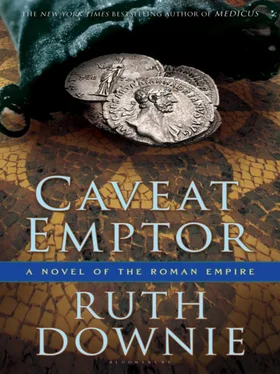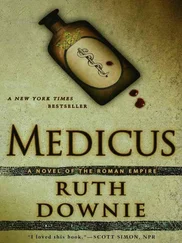Ruth Downie - Caveat emptor
Здесь есть возможность читать онлайн «Ruth Downie - Caveat emptor» весь текст электронной книги совершенно бесплатно (целиком полную версию без сокращений). В некоторых случаях можно слушать аудио, скачать через торрент в формате fb2 и присутствует краткое содержание. Жанр: Исторический детектив, на английском языке. Описание произведения, (предисловие) а так же отзывы посетителей доступны на портале библиотеки ЛибКат.
- Название:Caveat emptor
- Автор:
- Жанр:
- Год:неизвестен
- ISBN:нет данных
- Рейтинг книги:3 / 5. Голосов: 1
-
Избранное:Добавить в избранное
- Отзывы:
-
Ваша оценка:
- 60
- 1
- 2
- 3
- 4
- 5
Caveat emptor: краткое содержание, описание и аннотация
Предлагаем к чтению аннотацию, описание, краткое содержание или предисловие (зависит от того, что написал сам автор книги «Caveat emptor»). Если вы не нашли необходимую информацию о книге — напишите в комментариях, мы постараемся отыскать её.
Caveat emptor — читать онлайн бесплатно полную книгу (весь текст) целиком
Ниже представлен текст книги, разбитый по страницам. Система сохранения места последней прочитанной страницы, позволяет с удобством читать онлайн бесплатно книгу «Caveat emptor», без необходимости каждый раз заново искать на чём Вы остановились. Поставьте закладку, и сможете в любой момент перейти на страницу, на которой закончили чтение.
Интервал:
Закладка:
The father sent the younger children back to the house in the care of the oldest girl. When they had disappeared around the bend in the river, he said, “Please don’t be angry, sir. They are just kids. He frightened them.”
“And he grew into a monster?”
“Just a bit of fun. With the taxes and a sick wife and the price of seed corn, we need money.”
Ruso flipped the denarius over again, then held out his hand for the man to take it. “Tell me,” he said.
Soon afterward Ruso’s horse was picking its way back along the shady track toward the main road and its rider was deep in thought.
Very early on the morning after Asper had disappeared, Lund’s children had gone down to the river to fetch water. A terrifying figure with blood on his face and mud all over his clothes rose from the reeds farther along the riverbank and demanded to know where he was. The first Lund knew of it was when he heard them running toward the house screaming about a monster. By the time he reached the bank, the boat had been loosed from its mooring and was drifting out of sight around the bend in the river. He could not see if there was anyone in it.
He had accused the children of untying it and inventing the monster to avoid a beating, but they all told the same story and passed it on to the neighbors’ children. Within a couple of days the tale had grown and spread along the course of the river. It was some time before Lund heard about the disappearance of Julius Asper and began to wonder if the monster-who might originally have fit his description-had something to do with it.
“Are you sure there was just the one man? Could there have been somebody with him?”
“Just the one,” insisted the man. “We did him no harm, sir.”
“There were two men went missing.”
“If the brother was here, the dogs would find him,” said the man, grasping his meaning.
Ruso paused, distracted. “Is that your wife coughing?”
“The same all through the winter, sir.”
Most people suffered from coughs and chilblains through the damp British winter, but generally those who survived had recovered by now. “Has she seen a doctor?”
“They all try something different. Now she is thin as a stick and brings up blood.”
There was no point in offering a further prognosis. It would not be good. “Leek juice with frankincense might help a little,” he suggested, wishing he had brought his supplies with him. “And whatever they tell you, don’t let them bleed her more than once every three weeks.”
Before he left he remembered to tell the man where his boat was. It was not much consolation. Turning the horse’s head north, he rode past an elderly couple shuffling along carrying a basket full of cabbages and leeks between them. He wondered what sort of welcome Tilla had received in Verulamium. With luck he would sort out this Julius Asper business to Metellus’s satisfaction and her name would be erased from the list. If not, as soon as it was over he would suggest they pack up the red crockery and the baby clothes and take the next ship back to Gaul.
30
These days Hadrian’s reforming zeal had seen to it that all lodging houses for traveling officials were centrally administered. The majority of every mansio’s staff, however, were bound to be locals. Ruso suspected there would still be a wide variation, not only in style, but in the guests’ confidence that nobody might have spit in the soup. However, he was optimistic about Verulamium. It was a major town on one of the busiest routes in the province. The governor must travel this way regularly on his trips to the troubled North. If the natives here were the sort who wanted a theater, they would also want to impress with the size of their bathhouse, the jingle of coins at their market-and, hopefully, the welcome they afforded to the representatives of Rome.
Before he could sample that welcome, he found himself held up outside the town gates. Easing the sweating horse past a couple of vehicles whose drivers were obliged to wait in line, he saw that the delay was being caused by a couple of natives sporting military-style chain mail and red tunics. One of them was the strapping youth who had been escorting Caratius around Londinium. They were equipped with daggers and their spears looked like standard army issue, but in the place of swords they wore stout wooden clubs. He recalled his conversation with Metellus: presumably the routine wearing of swords would have indicated that the local guards had ideas above their station.
Today they were stopping everyone to ask in both British and heavily accented Latin whether anyone had seen a man named Bericus. They were looking very bored with the job until Ruso asked whether a carriage with two women, a baby, and a body had arrived from Londinium. The big one glanced across at the sound of his voice and announced, “It’s the investigator!”
His arrival seemed to straighten their shoulders and brighten their eyes. After confirming that his wife had arrived safely, Ruso followed the guard’s directions though a grid of busy streets and introduced himself to the bandy-legged overseer of the mansio stables. The man put down the bridle he was inspecting and shouted what sounded like “He’s here, lads!” in British before ordering one man to lead the horse away across the yard, a second to carry the investigator’s luggage around to reception-“Is that all you’ve got, sir?”-and a third to fetch a drink. “I’m Rogatus, sir,” he said, adding, “We’ve been expecting you,” as if Ruso might not have guessed. He glanced around, evidently looking for something. “Just you at the moment, is it, sir?”
“Just me.”
“I’ll take you across to your rooms right away. When your men arrive we’ll tell them-”
“There aren’t any men. It’s just me.”
“Ah! Well, not to worry. You’ll find everyone very willing to help. We’re all loyal to the emperor here.”
“Good,” said Ruso, wondering why it was necessary to say so.
“Always the first to send in our taxes, sir. Famous for it.”
Ruso refrained from pointing out that the town was known less for enthusiastic taxpaying than for being ravaged by people who wanted to pay no taxes at all. “Is everyone expecting me, or were you told in confidence?”
The man looked surprised, as if it had never struck him that an investigator might want to be discreet. “No, sir. The chief magistrates had a notice read out in the Forum this morning. You’ve been announced in both languages, just in case.”
Ruso suppressed a sigh and grasped the welcome cup of cool water. As he drank, the man stepped aside to deal with a question about a damaged axle before returning to say, “They said anyone with information was to come forward and tell you, sir.”
Clearly the Council had given up any idea of keeping the loss a secret. Now the whole town would be waiting to see what the procurator’s man would do about it. He had escaped from a small gang of willing helpers only to be confronted with a large one.
“You can be the first,” he said. “Tell me about Asper’s transport. Was it one of the public vehicles?”
“Asper had a warrant, sir. He made official journeys.”
Evidently they thought he was here to inspect the transport arrangements too. He handed his cup to the hovering servant and indicated that they could talk as they walked. “Did he always drive himself?”
“We didn’t have a man available, sir. It was pouring rain, and he was late starting out. His brother could drive.”
“So you did him a favor by letting him take a decent carriage.”
“The tax had to be delivered, sir.”
Asper had not given a reason for the late start, and Rogatus had not felt it was his place to ask.
Читать дальшеИнтервал:
Закладка:
Похожие книги на «Caveat emptor»
Представляем Вашему вниманию похожие книги на «Caveat emptor» списком для выбора. Мы отобрали схожую по названию и смыслу литературу в надежде предоставить читателям больше вариантов отыскать новые, интересные, ещё непрочитанные произведения.
Обсуждение, отзывы о книге «Caveat emptor» и просто собственные мнения читателей. Оставьте ваши комментарии, напишите, что Вы думаете о произведении, его смысле или главных героях. Укажите что конкретно понравилось, а что нет, и почему Вы так считаете.












